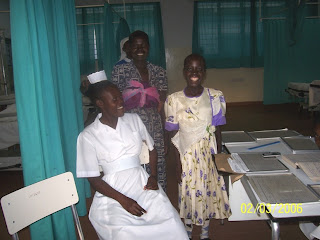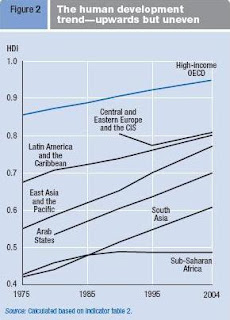
Caught in the Crossfire of Collateral Damage and Global Inaction.
To appear in Vocation for Justice June 2007
Sometimes one particular patient can cause you to pause and reflect and Martha a 10 year old girl and patient on the Intensive Care Unit is one patient whose story I would like to share. She was abducted by the Lord’s Resistance Army, a rebel group that has been fighting the government in northern Uganda for 20 years and when the government troops caught up with the rebels she was shot in the leg in the crossfire. The wound was not severe but one week later she developed tetanus caused by a wound infection. Thousands die from tetanus in Africa each year and it is a distressing condition with a painful death. The body is thrown into very strong spasms and most die from inability to breathe.
Our first line drugs were not working so we decided to use a treatment which is more expensive and challenging to the staff because Martha would need a tracheostomy, an opening in her throat, and be placed on a ventilator for 3 weeks.

In 20 years of practice in Britain I cannot recall seeing a patient with tetanus because with a few injections almost the whole population is immunised. In Africa the weak infrastructure of basic healthcare means that many are just not immunised and with insecurity the weak infrastructure collapses completely. Even in parts of Africa where there is no violent conflict tetanus remains a major cause of death. In Africa most children like Martha don’t survive but we thank God for her good recovery and pray for a change of heart in those who justify war and its collateral damage. Martha was a victim of war in both her direct wound and secondly in her lack of immunity. Likewise the sick and poor of Africa are also the collateral damage of our global lifestyle and wrong choices of inaction.
The health statistics of sub-Saharan Africa are the worst in the world and the inequality is widening every year. Life expectancy is improving in every continent except Africa and despite many sound bites and photo opportunities of politicians and celebrities the structural changes which could easily be initiated to reverse this violence of poverty is not on the agenda even now. In 1970 a commitment to increase international aid to 0.7% of Gross National Product was made by all countries in the United Nations yet 37 years later it has not yet been met by Britain. In trade relationships Africa is in an even worse situation. In 2000 900 US$ was given to a European cow from the EU in subsidies annually and 8 US$ in aid to an African. Our political leaders have promised little and done almost nothing and until we face this reality the continued structural violence of poverty to Africans like Martha will continue. If effective action is to be taken of global significance then it must address the sacred cows of not only the European Union but also the sacred cow of military spending. In 2004 globally one thousand billion US dollars was spent on the arms trade each year while 78 billion US $ was spent on Aid and our government is a major arms trader. We have the funds if we chose to use them to promote life in Africa.
It is perplexing to see that there is no direct coalition between those who work for peace and those who work for development. Surely local Charity Law must be waived in the face of the present carnage of African lives and Christians should have a holistic approach. The current strategy is just not working and never will. The global resources are available to make a difference but we ask for too little. Slavery was present in Africa for 400 years and on current figures the slavery of absolute poverty will continue for another 400 years. Wilberforce campaigned for Abolition of the slave trade not for a partial alleviation of its worst effects.
On Ash Wednesday I had the privilege of joining other Christians at the Ministry of Defence, London in opposing our nuclear addiction to the greatest weapon of mass terror that humanity has ever invented. Our Chancellor has found the necessary funds for the potential holocaust of the Trident weapon system to be renewed at a cost of possibly 40 billion US$ yet the avoidable deaths in Africa are equivalent to a Hiroshima and Nagasaki occurring every week. The potential holocaust we plan for in Trident is already happening in Africa now.
The amount in aid from Britain according to Oxfam is worth one cup of coffee per person each week. The poor of Africa are relying on us to demand from our leaders on a different scale than has yet been done. Until we face this truth we can expect little global change and in 2015 we will record yet another series of broken promises for the poor of Africa.
Dr.Ray Towey is a lay missionary who has been working in East Africa for 14 years. raymond.towey@btinternet.com
To appear in Vocation for Justice June 2007
Sometimes one particular patient can cause you to pause and reflect and Martha a 10 year old girl and patient on the Intensive Care Unit is one patient whose story I would like to share. She was abducted by the Lord’s Resistance Army, a rebel group that has been fighting the government in northern Uganda for 20 years and when the government troops caught up with the rebels she was shot in the leg in the crossfire. The wound was not severe but one week later she developed tetanus caused by a wound infection. Thousands die from tetanus in Africa each year and it is a distressing condition with a painful death. The body is thrown into very strong spasms and most die from inability to breathe.
Our first line drugs were not working so we decided to use a treatment which is more expensive and challenging to the staff because Martha would need a tracheostomy, an opening in her throat, and be placed on a ventilator for 3 weeks.

In 20 years of practice in Britain I cannot recall seeing a patient with tetanus because with a few injections almost the whole population is immunised. In Africa the weak infrastructure of basic healthcare means that many are just not immunised and with insecurity the weak infrastructure collapses completely. Even in parts of Africa where there is no violent conflict tetanus remains a major cause of death. In Africa most children like Martha don’t survive but we thank God for her good recovery and pray for a change of heart in those who justify war and its collateral damage. Martha was a victim of war in both her direct wound and secondly in her lack of immunity. Likewise the sick and poor of Africa are also the collateral damage of our global lifestyle and wrong choices of inaction.
The health statistics of sub-Saharan Africa are the worst in the world and the inequality is widening every year. Life expectancy is improving in every continent except Africa and despite many sound bites and photo opportunities of politicians and celebrities the structural changes which could easily be initiated to reverse this violence of poverty is not on the agenda even now. In 1970 a commitment to increase international aid to 0.7% of Gross National Product was made by all countries in the United Nations yet 37 years later it has not yet been met by Britain. In trade relationships Africa is in an even worse situation. In 2000 900 US$ was given to a European cow from the EU in subsidies annually and 8 US$ in aid to an African. Our political leaders have promised little and done almost nothing and until we face this reality the continued structural violence of poverty to Africans like Martha will continue. If effective action is to be taken of global significance then it must address the sacred cows of not only the European Union but also the sacred cow of military spending. In 2004 globally one thousand billion US dollars was spent on the arms trade each year while 78 billion US $ was spent on Aid and our government is a major arms trader. We have the funds if we chose to use them to promote life in Africa.
It is perplexing to see that there is no direct coalition between those who work for peace and those who work for development. Surely local Charity Law must be waived in the face of the present carnage of African lives and Christians should have a holistic approach. The current strategy is just not working and never will. The global resources are available to make a difference but we ask for too little. Slavery was present in Africa for 400 years and on current figures the slavery of absolute poverty will continue for another 400 years. Wilberforce campaigned for Abolition of the slave trade not for a partial alleviation of its worst effects.
On Ash Wednesday I had the privilege of joining other Christians at the Ministry of Defence, London in opposing our nuclear addiction to the greatest weapon of mass terror that humanity has ever invented. Our Chancellor has found the necessary funds for the potential holocaust of the Trident weapon system to be renewed at a cost of possibly 40 billion US$ yet the avoidable deaths in Africa are equivalent to a Hiroshima and Nagasaki occurring every week. The potential holocaust we plan for in Trident is already happening in Africa now.
The amount in aid from Britain according to Oxfam is worth one cup of coffee per person each week. The poor of Africa are relying on us to demand from our leaders on a different scale than has yet been done. Until we face this truth we can expect little global change and in 2015 we will record yet another series of broken promises for the poor of Africa.
Dr.Ray Towey is a lay missionary who has been working in East Africa for 14 years. raymond.towey@btinternet.com
Good web page














.JPG)










